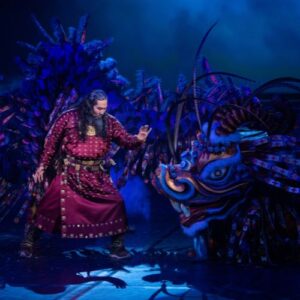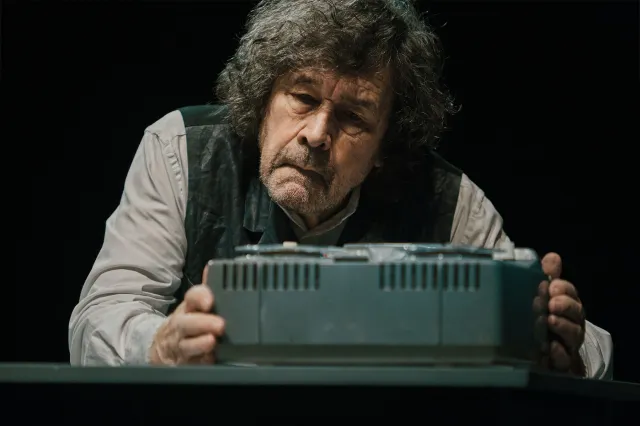Although I know it’s only November, it’s late in the day, whether you like it or not, and we are in the festive season. Theatrically that means two things, clawing sentiment and brashy spectacle. It rarely means a flurry of Mongolian culture in the West End’s largest theatrical venue.
The Mongol Khan started life as the 1998 play The State Without a Seal by Lkhagvasuren Bavuu. Through producer Hero Baatar’s machinations and Anglo-angled-aim, it has morphed into the show currently running in London. From sell-out performances in the Mongolian State Academic Theatre (550 seats) to the London Coliseum’s Edwardian grandeur and 2,359 seats. On the way, it has collected famous creatives like infinity stones. Respected playwright Timberlake Wertenbaker adapted the piece for a Western audience and historian John Man translated the original text. Also in the creative team are Nick Barnes of Life of Pi puppet fame and Andrew Ellis, Mike Robertson and David Gregory as lighting designers. With such titans at the helm, one could ask what more would a play need to succeed. How about 70 or more performers? Yep, that’ll do it.
The plot, a more tragic Comedy of Errors, is set in the Hunnic Empire, an ancient precursor to the more internationally famous Mongols. A great Khan has two children from two wives and there is debate over the legitimacy of son A, so son B is crowned. Baby swapping (think 209 BCE Blood Brothers), Machiavellian plotting and lots of bloodshed follow. Everyone is very unhappy. Despite Bavuu’s image-filled writing and Wertenbaker’s adaptation, the script is like an overburdened horse, repetitive and stiffly formal in its attempt at resonance. The two queens are woefully stereotypical sketches of historic women. Either weak or lovingly docile and at odds with the strong Mongol women later in the region’s timeline such as Hoelun or Alan Goa. The problematic use of epilepsy as a marker for evil in both the big villain and his swapped son is a little uncomfortable as well.
Yet shockingly for a pedantic critic like me, the two-dimensional characters, sporadic plot and overuse of the lightning sound effect didn’t bother me in the slightest. Do you know why? The sheer extravagance of the thing. The massive stage is constantly filled with bodies, vibrancy and razor-precise movement. Visually it is a feast. Never a moment of bad blocking or choreography and never is the eye left to wander. The rich tapestries cascading down the sides of the proscenium, the golden horses, and Bold Ochirjantsan’s lavish gold garments, all outcompete Frank Matcham’s 1904 theatrical interior.
As the main characters battle with the idea of statesmanship and honour (rather lugubriously), a literal army of performers moves in starling-like murmurations around them. Moving them around the stage, standing in for them, or enacting their will like spirits (a final battle is appropriately epic). Khashkhuu Khatankhuyag and Bayarbaatar Davaasuren’s choreography has quite the task. As does Ochirjantsan’s costumes and Odbayar Battogtokh’s score of blending the diverse concept of historic Mongolia into a digestible format for an audience, the majority of which is unlikely to have a detailed knowledge of the background to the story being told. But how they succeed.
My lower jaw was frequently on my knees. Gigantic golden pheasant feathers swing on 15 heads, billowing sail-like dresses wave in the air, and a dragon (courtesy of Barnes) bellows smoke. Oh, and the dancing, masks flash and cavort, the circles of actors on actors swirling and swelling, crafting this nomadic world with such breath-taking detail.
Erdenebileg Ganbold is our Grand Khan, with a stern and solid presence and voice that could cause subsidence in any household. Bold-Erdene Sugar is his rival and (unexplained) vengeful antagonist. Uranchimeg Urtnasan and Dulguun Odkhuu as the two queens do their best with limited material to work with, and Shinebayar Baasankhuu and Dorjsuren Shadav as their sons provide the easy bad and good dichotomy. Yes, the acting style is melodrama at its least mellow, but if you want complex characters go see an Ibsen!
The music, a blend of many different folk styles, western classical and modern techno thumping is almost completely pre-recorded, and the songs are lip-synced. Although still impressive, it adds a Disney World disconnect to the whole thing. Lastly, for a world dominated by the horse, the creatures (in puppet form of course) are remarkably absent.
But these are the niggles of a picky eater. Abandon Swan Lake, cast aside panto, and say no to Sunset Boulevard, instead sustain yourself on a hefty slice of one of the world’s most fascinating cultures. Be dazzled as it bounds, spins and slashes its way around the London Coliseum. It is unlike anything I have ever seen, and that is saying something. The rumbling timbre of the tempestuous language, the haunting hum of throat singing, or the tingling of the golden headdresses. It is time travel; pure and simple, theatre at its most transformative and most phenomenal.



